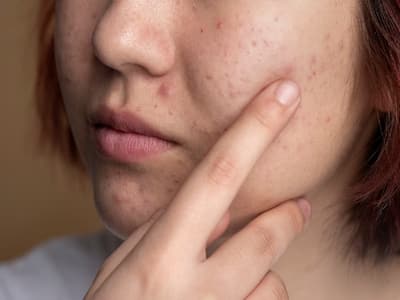
Hormones play a pivotal role in skin health. Read on to know the causes of hormonal acne and how to manage it.
Skin, the body’s largest organ, acts as a protective barrier against external elements and reflects internal health. Among the many factors influencing skin health, hormones play a pivotal role. Hormonal acne, a common concern for many individuals, highlights the intricate interplay between hormonal fluctuations and skin health. In this article, Dr. G Ravichandran, Sr. Consultant Dermatology, Apollo Spectra Hospital, Chennai, explains the connection between hormones and skin health, shedding light on the causes and management of hormonal acne.
The Hormonal Influence
Hormones are regulatory molecules that orchestrate a wide array of bodily functions. While their effects are diverse, they significantly impact skin health due to their interaction with sebaceous glands, which produce an oily substance called sebum. Androgens, a class of male hormones present in both males and females, are particularly relevant to hormonal acne. Increased androgen levels stimulate sebum production, leading to oily skin and clogged pores the prime culprits behind acne development.
Puberty and Adolescence
Puberty marks a significant hormonal shift, affecting teenagers’ skin health. During this period, the body experiences surges in androgen production, causing sebaceous glands to become more active. The excessive sebum production, coupled with the shedding of dead skin cells, forms a breeding ground for acne-causing bacteria. Consequently, hormonal acne is especially prevalent among adolescents, often causing distress and impacting self-esteem.
Menstrual Cycle
The menstrual cycle’s ebb and flow of hormones contribute to the cyclical nature of hormonal acne in women. The week before menstruation, known as the luteal phase, witnesses a rise in progesterone levels. This leads to increased sebum production and a heightened susceptibility to inflammation, paving the way for acne flare-ups. Many women notice breakouts around this time, emphasizing the link between hormones and skin health.
Polycystic Ovary Syndrome (PCOS)
For some women, hormonal acne is a symptom of underlying conditions like PCOS. PCOS involves hormonal imbalances that can lead to excess androgen production. This hormonal imbalance not only triggers acne but can also result in other skin manifestations like hirsutism (excessive hair growth) and alopecia (hair loss). Managing PCOS often involves a multifaceted approach, addressing both the hormonal and dermatological aspects.
Pregnancy
Pregnancy entails profound hormonal shifts, which can impact skin health. While some women experience a pregnancy glow due to increased blood flow and hormonal changes, others encounter hormonal acne. Fluctuations in estrogen and progesterone levels can influence sebum production and skin cell turnover, sometimes leading to acne development. However, treating hormonal acne during pregnancy requires caution, as certain acne medications may pose risks to the developing fetus.
READ RELATED: 9 Fast-Food Lawsuits You Won't Believe Are Real
Managing Hormonal Acne
Understanding the hormonal basis of acne is crucial for effective management. Topical treatments containing ingredients like benzoyl peroxide, salicylic acid, or retinoids can help control acne by reducing inflammation and unclogging pores. Dermatologists may also recommend oral contraceptives for women to regulate hormonal fluctuations and mitigate acne.
Lifestyle modifications also play a pivotal role in managing hormonal acne. A balanced diet, rich in antioxidants, vitamins, and minerals, supports overall skin health. Regular exercise and stress management techniques can help regulate hormones and minimize acne triggers. Adequate sleep and a consistent skincare routine tailored to one’s skin type are also essential components of acne management.
Conclusion
The intricate connection between hormones and skin health underscores the significance of understanding hormonal acne. From the hormonal surges of puberty to the cyclical changes of the menstrual cycle and the complexities of conditions like PCOS, hormones wield considerable influence over our skin’s appearance. By recognizing these connections and adopting a comprehensive approach to skincare and lifestyle, individuals can effectively manage and mitigate the impact of hormonal acne, fostering healthier and more confident skin.
Total Wellness is now just a click away.
Follow us on
Don’t Miss Out on the Latest Updates.
Subscribe to Our Newsletter Today!
window.addEventListener(‘load’, (event) => {
$(‘#commentbtn’).on(“click”,function(){
(function(d, s, id) { var js, fjs = d.getElementsByTagName(s)[0]; if (d.getElementById(id)) return; js = d.createElement(s); js.id = id; js.src = “//connect.facebook.net/en_US/sdk.js#xfbml=1&version=v2.3”; fjs.parentNode.insertBefore(js, fjs);}(document, ‘script’, ‘facebook-jssdk’));
$(“.cmntbox”).toggle();
});
});










